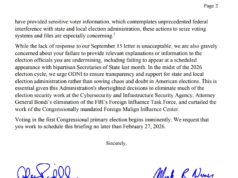From Senators Mark Warner and Tim Kaine:
STATEMENT OF U.S. SENS. MARK R. WARNER & TIM KAINE
~ On Congressional passage of the FY 2022 government spending bill ~
WASHINGTON – U.S. Sens. Mark R. Warner and Tim Kaine (both D-VA) today voted for the passage of the $1.5 trillion government spending bill. This package funds the federal government through Fiscal Year 2022, delivers $13.6 billion in aid to Ukraine, provides critical legal and funding authorities to the intelligence community, allows for full implementation of the bipartisan infrastructure law, reauthorizes the Violence Against Women Act, and delivers countless wins for families in Virginia and across the country.
“Today the Senate voted to pass a full-year spending bill. While this deal took too long to come together, and concessions were made on both sides, I am proud that we have a bipartisan package that will deliver urgently needed humanitarian aid and military assistance to the people of Ukraine, avert a costly government shutdown, and deliver on key funding for projects that will boost our economy and invest in communities across the country and throughout the Commonwealth. This package will also deliver on key priorities I have been fighting for, including supporting military families, expanding access to rural broadband, addressing the IRS backlog that has delayed returns across the country, and reauthorizing the Violence Against Women Act for the first time since 2013,” said Sen. Warner. “Also in this spending package are the Intelligence Authorization Act and our bipartisan cyber incident reporting bill, key pieces of legislation that will enhance congressional oversight for the U.S. Intelligence Community – a critical move as we face some of the gravest global security threats of the past century. It will also improve transparency between private entities and the government in the event of broader cyber attacks. I am glad that we in Congress finally worked in a bipartisan way to get this done and start delivering for the American people.”
“This legislation is monumental for both our efforts here at home and on the international stage, by providing support for critical Virginia priorities and Ukraine’s security and humanitarian needs following Russia’s unjustified invasion,” said Sen. Kaine. “I’m also thrilled that I was able to include legislation I’ve been fighting for to ensure children of Gold Star families have access to the maximum Iraq and Afghanistan Service awards, as well as money specifically for projects addressing issues across Virginia, from mental health and teacher shortages to our infrastructure needs. America is at its best on days like this, when we face our challenges head on and provide needed leadership.”
The following list includes many of the provisions Warner and Kaine advocated for on behalf of Virginia that were included in the omnibus bill:
- Support for Ukraine: To support the people of Ukraine as they continue fighting Putin’s brutal and unprovoked assault, this bill includes $13.6 billion in funding to:
- Bolster the defensive capabilities of both the Ukrainian military and those of NATO Eastern flank countriesProvide urgently-needed humanitarian aid including migration and refugee assistance, and emergency food assistance, health care, and urgent support for vulnerable populations and communities
- Expand diplomatic programs to maintain American Citizen Services, support operations that were forced to vacate Ukraine, and increase State Department capabilities to target Russian oligarch assets
- Aid DOJ Ukraine Task Force efforts to address cybercrime and ransomware threats, trace and seize proceeds of crime, prosecute sanctions violators, and address export control, sanctions and cyber cases.
- Cyber Defenses: Includes $2.6 billion in funding for the Cybersecurity and Infrastructure Security Agency to bolster the nation’s cyber-defenses. It also includes Warner-sponsored legi
slation to require companies responsible for U.S. critical infrastructure to report cybersecurity incidents to the government.
- Military Pay Increase: Supports a pay increase of 2.7 percent for servicemembers and Department of Defense civilian personnel, and funds a $15 minimum wage for DoD personnel, in support of President Biden’s Executive Order.
- Military Families: Provides $1.4 billion in funding to improve and maintain housing, and address challenges related to privatized military housing impacting servicemembers and their families. It also provides $278.1 million in housing assistance and $119.6 million for food assistance efforts for servicemembers and their families. For years, Sens. Warner and Kaine have fought to improve housing conditions. Sen. Warner has also been focused on improving food access for servicemembers and their families.
- Medical Care for Veterans: Provides $97.5 billion for medical care at the VA – an 8.7 percent increase over last year – to address the health care needs of our nation’s veterans, both ongoing and deferred care due to the pandemic. This includes $840 million in gender-specific healthcare for women.
- Benefits Boost: Provides $3.5 billion to provide compensation benefits to veterans and their survivors, which will aid the VA in decreasing the claims backlog, and supporting new toxic exposure claims.
- Veterans’ Mental Health: Provides $13.2 billion in funding, which includes $598 million for suicide prevention outreach.
- Veterans’ Rural Health: Provides $2.4 billion for telehealth services to reach veterans, and $327 million to support improved access to care in rural areas.
- Veterans’ Homelessness: Provides $2.2 billion for efforts to reduce homelessness among veterans and their families.
- IT Modernization: Includes $5.5 billion in funding for IT modernization efforts at the VA.
- Shipbuilding: Provides more than $26 billion in funding for critical Navy shipbuilding priorities, many of which have a direct connection to Virginia and the Hampton Roads region, to include: Ford-class Aircraft Carrier Construction ($2.34 billion), Aircraft Carrier Overhaul ($2.48 billion), and Virginia- ($6.33 billion) and Columbia-class ($4.77 billion) Submarine construction.
- Virginia military construction: Provides more than $361 million in funding for 11 military construction projects across the Commonwealth, including in Norfolk, Portsmouth, Quantico, Ft. Belvoir, Sandston, Troutville, and at the Pentagon.
- School Construction: Includes more than $500 million in funding for public schools on military installations nationwide, to fund construction, expansion, renovation, and repairs.
- Climate Resilience: Provides $100 million for the Department of Defense to address resilience issues at installations stemming from climate change.
- Intelligence Authorization Act: Includes the Intelligence Authorization Act for Fiscal Year 2022, which authorizes funding, provides legal authorities, and enhances congressional oversight for the U.S. Intelligence Community – a priority for Sen. Warner as Chairman of the Senate Intelligence Committee.
- Havana Syndrome: Provides additional funding to support personnel who have been impacted by anomalous health incidents. Chairman Warner and Sen. Kaine have been outspoken on the need to support afflicted personnel.
- IRS Backlog: Provides $12.6 billion for IRS funding. This funding will help continue to eliminate the 2020 tax return backlog, more efficiently process 2021 tax returns, and improve customer service. Sens. Warner and Kaine have consistently supported sufficient funding to allow the IRS to meet the needs of taxpayers.
- Small Businesses: Provides $1 billion to the Small Business Administration to support investments in programs to help underserved entrepreneurs access capital and contracting opportunities.
- Funding for Community Development Financial Institutions: Provides $295 million for the CDFI Fund, including $173 million for financial and technical assistance grants and $35 million for the Bank Enterprise Award Program. Throughout the COVID-19 pandemic, Sen. Warner has successfully pushed for increased funding for CDFIs to support and advance access to capital for underserved communities in Virginia.
- Fighting Violence Against Women: Reauthorizes the Violence Against Women Act, marking the first time in nearly a decade that VAWA has been reauthorized. The bill also provides $575 million, the highest level ever, in funding provided for multiple competitive and formula grant programs that support training for police officers and prosecutors, state coalitions to respond to domestic violence and sexual assault, rape prevention programs, lethality assessment and homicide reduction initiatives, domestic violence hotlines, and women’s shelters and transitional housing support services.
- Jabara-Heyer NO HATE Act: Includes $5 million to assist state and local governments with entering data into the National Incident-Based Reporting System, which will improve how hate crimes are collected by the FBI, establish hate crime reporting hotlines, and develop and adopt policies on identifying, investigating, and reporting hate crimes. Sens. Warner and Kaine first introduced the Jabara-
Heyer NO HATE Act legislation in 2019. It is partially named after Heather Heyer, a Virginia constituent who was killed in the 2017 white supremacy protests in Charlottesville, Virginia.
- Ashanti Alert: Includes $1 million to help with the nationwide implementation of the Ashanti Alert system. In 2018, Sen. Warner secured unanimous Senate passage of the Ashanti Alert Act, legislation that will create a new federal alert system for missing or endangered adults between the ages of 18-64. The bill was signed into law on December 31, 2018.
- Pell Grant: The omnibus provides a $400 boost to the maximum Pell Grant in the 2022-23 school year to raise the maximum award to $6,895. This is the largest increase to the Pell Grant since the 2009-2010 school year. Over 137,500 Virginia students receive the Pell Grant each year. The omnibus also included the technical fix based on Sen. Kaine’s Protecting Our Gold Star Families’ Education Act to exclude the Iraq And Afghanistan Service Grant from sequestration and ensure that recipients of this grant have access to the maximum Pell Grant award.
- Rural Broadband: Provides more than $550 million for expansion of broadband service, including an additional $450 million for the ReConnect program to expand rural broadband access. Sens. Warner and Kaine have been longtime champions for increased access to broadband. As part of the American Rescue Plan, they secured $10 billion to help states, territories and tribal governments expand access to broadband.
- Rural Health Care: Provides more than $366 million for HHS rural health care programs, an increase of $36,593,000.
- Miners: Provides more than $11.8 million for clinics that provide critical health care for coal workers with job-related lung diseases. The bill also directs the Centers for Disease Control and Prevention (CDC) to prioritize maintenance of its Black Lung health screening mobile unit and urges the CDC to consider purchasing an additional unit, noting that early screening and detection of black lung can improve health outcomes and reduce mortality.
- Infrastructure Investments: The omnibus will finally fully fund the Infrastructure Investment and Jobs Act, specifically programs funded by the Highway Trust Fund. Without a full-year funding bill, Virginia could have lost out on $364 million in highway funding and $53 million in transit funding just this fiscal year. This also enables the new Carbon Reduction Program and PROTECT grants to get started.
- Shipyard Infrastructure: Includes $564 million to make significant and much-needed investments in our nation’s public shipyards, in support of the Navy’s Shipyard Infrastructure Optimization Plan (SIOP).
- Norfolk Harbor and Channels Deepening Project: Provides an additional $83.7 million for the U.S. Army Corps of Engineers to improve navigation and expand capacity by deepening and widening the harbor’s shipping channels. This will enable safer access for larger commercial and naval vessels and provide significant new economic opportunities to the region. This funding is in addition to the more than $69.3 million the Senators announced in January as a result of the IIJA.
- Colonial National Historical Park: Provides $128.7 million to help rehabilitate sections of the Colonial Parkway. This funding was included in the President’s FY22 budget request and was made available by the Great American Outdoors Act negotiated by Sen. Warner.
- Appalachian Regional Commission: Includes $195 million for the Appalachian Regional Commission (ARC), an increase of $15 million from FY21. This is in addition to the $1 billion provided to ARC through the Infrastructure Investment and Jobs Act over five years.
- Blue Ridge Parkway: Includes $32.8 million to help rehabilitate sections of the Blue Ridge Parkway. This funding was included in the President’s FY22 budget request and was made available by the Great American Outdoors Act negotiated by Sen. Warner.
- Chesapeake Bay Program: Includes $88 million for the Environmental Protection Agency’s Chesapeake Bay Program. This funding is in addition to the $238 million provided to the Chesapeake Bay Program over five years through the Infrastructure Investment and Jobs Act.
- Telehealth: Extends core telehealth flexibilities for 151 days past the expiration date of the Public Health Emergency (PHE).
- Synthetic Nicotine: Provides a legislative fix to clarify the Food and Drug Administration’s (FDA) authority to regulate products containing synthetic nicotine as tobacco products. Nicotine that can be chemically synthesized in a laboratory—rather than derived from tobacco—currently falls outside of FDA’s statutory definition of a tobacco product, which contributed to the explosion of youth use of e-cigarettes. Sen. Kaine worked with a bipartisan group of colleagues to successfully secure this language, aimed at reducing the number of children and teens addicted to harmful e-cigarettes.
- Maternal Vaccination: Includes provisions calling on the Secretary of Health and Human Services to consider the importance of vaccination awareness in carrying out public awareness campaigns. Specifically, the Secretary is asked to take into consideration the importance of increasing awareness and knowledge of the safety and effectiveness of vaccines to prevent disease in pregnant and postpartum women and infants, and the need to improve vaccination rates in such communities. This provision stems from Sen. Kaine’s bill, S.345, the Maternal Vaccinations Act.
- HBCU funding: Virginia’s five HBCUs, Hampton University, Norfolk State University, Virginia State University, Virginia Union University, and Virginia University of Lynchburg will receive additional support in Fiscal Year 2022 as HBCU’s nationwide will see a $35 million (8.0%) increase in funding.
- Head Start: Head Start received an increase of $289 million (2.7%) over last year’s funding level which will mean more than a $4 million increase in Virginia, a critical boost to Virginia’s 393 Head Start centers across the Commonwealth that provide early childhood education and care to nearly 15,000 young Virginians.
- CCDBG: The Child Care and Development Block Grant will receive over $250 million more (4.3% increase) than last year. Support for CCDBG is critical in helping low-income families access affordable child care. This funding increase comes in addition to $580 million in supplemental CCDBG funding for Virginia through the COVID-19 relief bills, and the nearly $488 million provided by the American Rescue Plan to child care providers to enable them to stay open.
- Southeast Crescent Regional Commission: The bill provides $5 million, an increase of $4 million above the fiscal year 2021 level and $2.5 million above the President’s request. This funding targets the economic development needs of distressed portions of Alabama, Florida, Georgia, Mississippi, North Carolina, South Carolina, and Virginia. In July, Kaine and Representative McEachin were joined by Warner in sending a delegation letter to President Biden advocating for this historic funding and the appointment of a federal co-chair.
As part of FY2022 appropriations, the Senate also revived a process that allows members of Congress to make Congressionally Directed Spending requests, otherwise known as earmarks, in a manner that promotes transparency and accountability. This process allows Congress to dedicate federal funding for specific projects. Through strong advocacy, Sens. Warner and Kaine were able to secure dedicated funding for Virginia communities totaling more than $85 million dollars.
More information regarding specific projects in Virginia that will receive Congressionally Directed Spending is available below:
- For projects in Northern Virginia, click here.
- For projects in Central Virginia, click here.
- For projects in the Shenandoah Valley, click here.
- For projects in Southwest Virginia and Southside, click here.
- For projects in Hampton Roads, click here.


![Video: Sen. Mark Warner Says He’s “concerned that [the Trump administration] may try out some of their [voter suppression] tactics” in the VA Redistricting Referendum in April](https://bluevirginia.us/wp-content/uploads/2026/02/warner0212-238x178.jpg)









